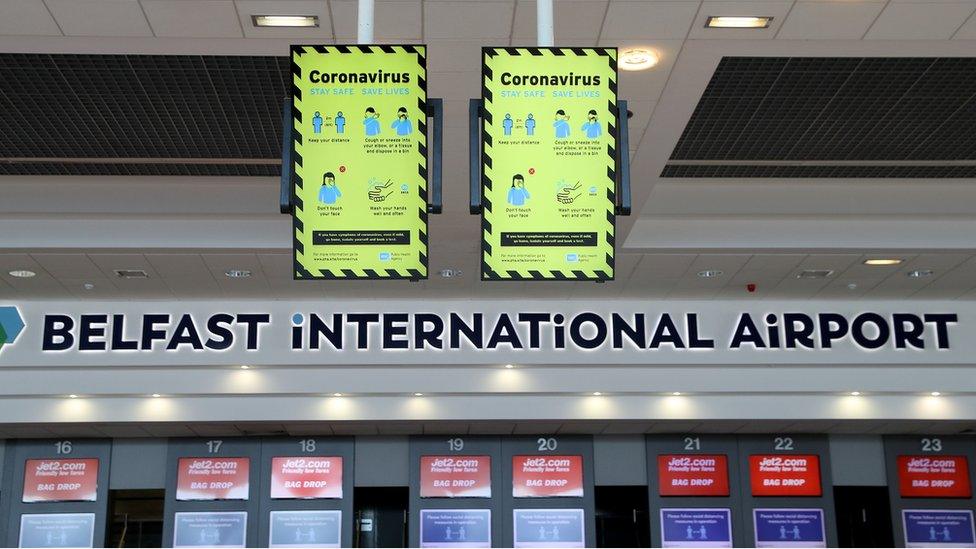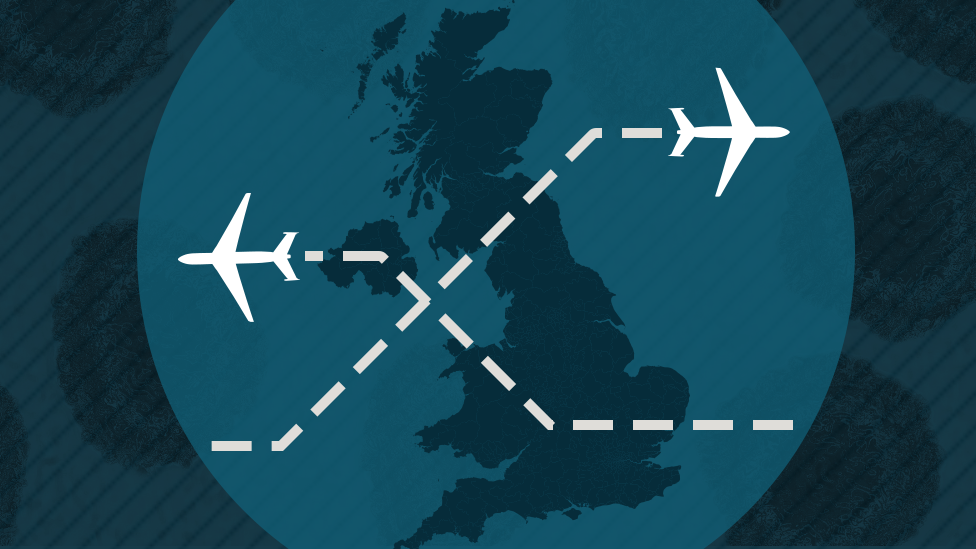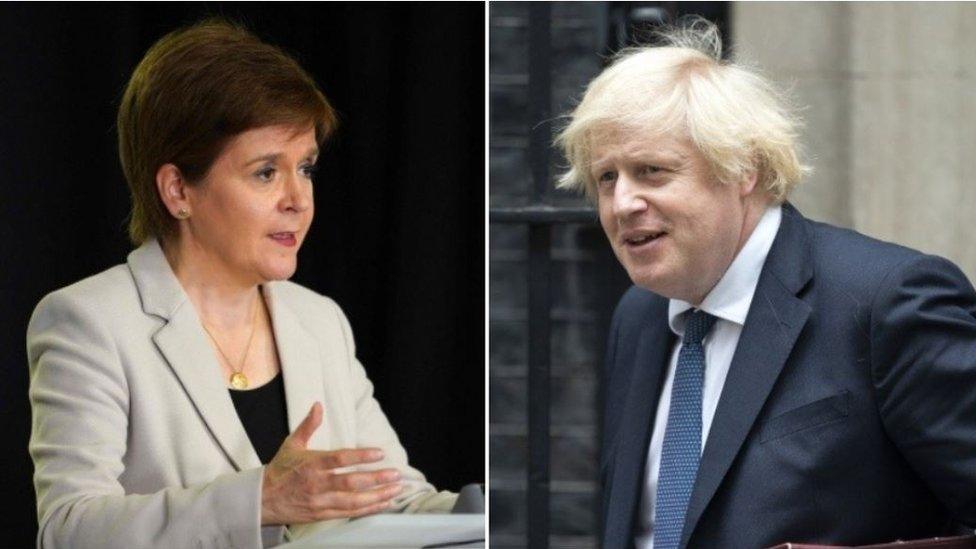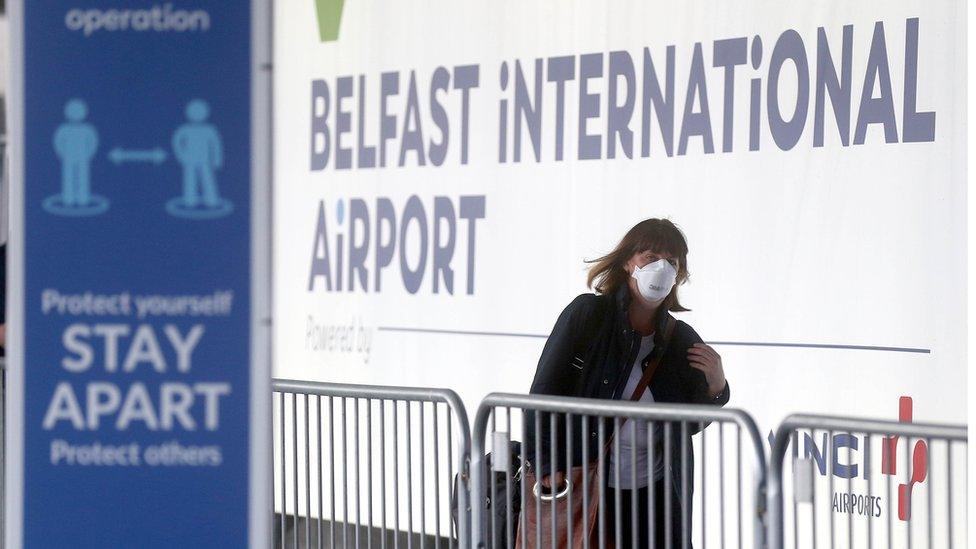Coronavirus travel: GB travellers pose 'greatest Covid risk' to NI
- Published
- comments

Northern Ireland Secretary Brandon Lewis says there will not be a quarantine between UK regions
Stormont's health minister has been advised that travellers from the rest of the UK present "the greatest risk" of bringing Covid-19 into NI, BBC News NI has learnt.
The advice comes from the executive's chief medical officer and chief scientific adviser.
Ministers will review the international travel regulations on Thursday.
Northern Ireland Secretary Brandon Lewis said there would not be a quarantine between UK regions.
Mr Lewis told BBC News NI's Evening Extra he had not seen the advice but believed it was important to protect "the viability of the Common Travel Area".
The secretary of state said health teams across the UK would be "focused on where there are outbreaks to deliver local lockdowns to protect the health of people more widely".
The Department of Health said it had no comment to make on the content of executive papers.
However, Health Minister Robin Swann has said decisions around travel restrictions are a matter for the NI Executive, a department spokesperson said, adding that Mr Swann wanted "to see it resolved" at Thursday's meeting.
The document, which has been seen by BBC News NI, says the advice is "based purely on risk to virus transmission and propagation of the epidemic".
Health measures like quarantine are set by each UK nation separately.
From Friday 10 July, passengers entering England from dozens of countries will not have to quarantine, under what are known as "air bridges".
Northern Ireland's current position remains that travellers arriving from outside the UK and the Republic of Ireland must quarantine for 14 days, but ministers are due to review this issue on Thursday, based on a paper from Mr Swann's department.
This latest document says that the overall UK prevalence/incidence of the virus is "substantially greater" than in Northern Ireland.
No decision taken yet on approach
"With regard to introducing the epidemic into Northern Ireland, travellers from the rest of the UK create by far the greatest risk, both in relative and absolute terms," it adds.

The scene at Belfast International Airport with social distancing guidelines in place
The advice says that travellers from any country ranked with a prevalence higher than the Republic of Ireland, using the UK government's methodology, will have a "somewhat increased risk of infection", while travellers from some of the countries "would have at least twice the risk".
"Imposing restrictions on travellers from these countries would currently have much less benefit than imposing restrictions on travellers from the rest of the UK," it adds.
The advice concludes that any approach adopted by Stormont would need to be "revisited regularly" as the incidence and prevalence of the virus is changing constantly.
Executive accused of 'dithering'
The managing director of Belfast International Airport previously criticised the quarantine measures adopted by the executive as "a stake through the heart" of its summer trade.
On Wednesday, Graham Keddie warned hundreds of jobs could be lost if the Stormont executive does not follow England's approach in opening up air bridges.
"The lack of the decision is the stupid thing. This seems to be dithering, as there is in Scotland, England's made the decision to go ahead and open up to almost 53 countries," he told BBC Radio Ulster's Stephen Nolan Show.
"Why no decision here? Why are Northern Ireland's views different from England? Show us the facts."
Mr Keddie said it was crucial that airports were able to operate fuller services as soon as possible.
In the Republic of Ireland, official government advice against all non-essential travel is to remain in place until 20 July.
The Irish government had planned to publish a "green" list of countries.
However, concern about surges of the virus in other countries prompted health advice that those restrictions should remain in place.
- Published24 December 2020

- Published1 July 2020

- Published15 June 2020
